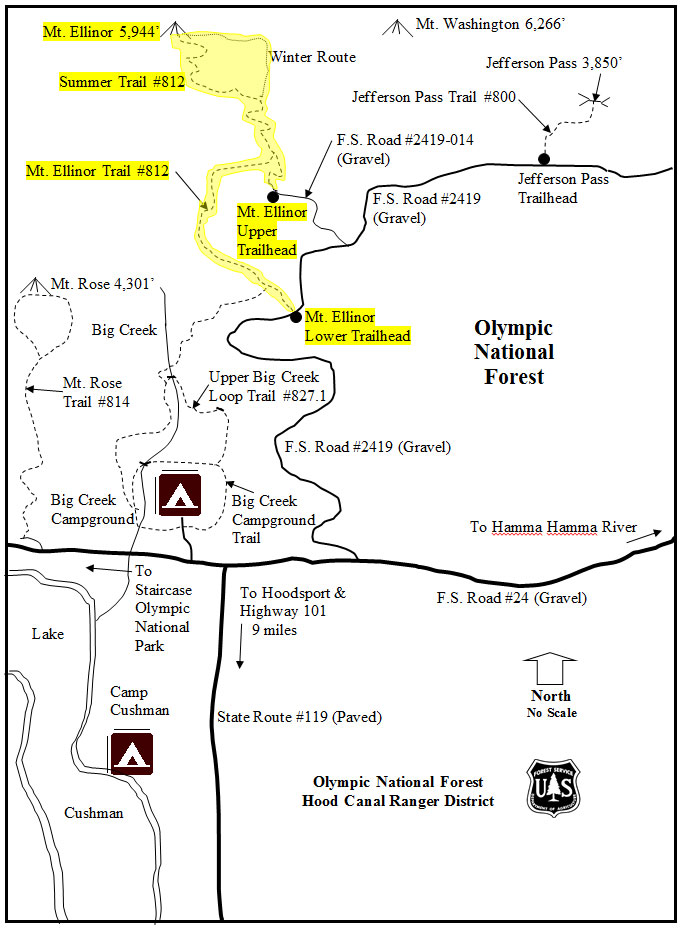Peninsula Daily News
news sources
HOODSPORT — Several reports of aggressive mountain goats have prompted Olympic National Forest officials in Mason County to close a popular trail on Mount Ellinor for at least two weeks.
The emergency closure, effective Tuesday, affects both the upper and lower portions of Mount Ellinor Trail No. 812.
Stephanie Neil, recreation manager for the Hood Canal Ranger District of Olympic National Forest, told the Peninsula Daily News that in the last two weeks rangers had received a number of reports of goats coming very close — within 10 feet — to hikers.
“Nobody has been hurt by the goats,” she said. “But a number of people have felt threatened.”
She said Tuesday that forest rangers will re-evaluate the closures in about two weeks.
“We want to keep the closure as short as possible,” Neil said. “But we also want people to be safe.”
Olympic National Forest wildlife biologist Kurt Aluzas said while mountain goats are powerful and inquisitive, they aren’t generally aggressive.
He said the recent behavior is likely related to the year’s deep snowpack that has confined the goats to trailside areas close to people.
There is also the possibility that female goats are protecting their young, he added.
Violating the order could bring a maximum penalty of a $5,000 fine and six months in jail.
On Oct. 16, 2010, a 63-year-old hiker from Port Angeles, Robert Boardman, was fatally gored by a 370-pound mountain goat in Olympic National Park.
The attack occurred in a mountainous area about 75 miles northeast of Mount Ellinor. Boardman’s widow and stepson have filed a suit against the National Park Service. It was the first death from a wild animal in the park’s history.
There are no current trail closures in Olympic National Park because of mountain goat activity, Neil said.
After Boardman’s attack, Olympic National Forest officials said that the only known aggressive mountain goat encounter in the national forest happened in 1999. It was not a fatal attack — Mike Stoican of Allyn said he was gored by a mountain goat near the summit of Mount Ellinor.
In June 2011, Jim Decker of Shelton said he was hiking in a nearby area, on the Mount Rose trail near Lake Cushman, when he encountered a mountain goat that stalked him persistently before finally backing off.
Mount Ellinor is in the Mount Skokomish Wilderness. The trail provides sweeping views of the Olympic Mountains and Puget Sound.
The trailhead is about 18 northwest of Hoodsport and about 25 miles north of Lake Cushman. The lower trailhead lies at an elevation of 2,600 feet. The nearby Upper Big Creek and Mount Rose trails remain open.
There are about 2,000 to 3,000 mountain goats in Washington state. They have razor-sharp horns and hooves and furry bodies covered by long, white hair. Their habitat stretches from the northern border through the Cascade Mountains to the Oregon border.
They were introduced into the Olympic Mountains from Alaska in the 1920s for hunters.
After Boardman’s death, Olympic National Park rangers warned hikers to keep at least 50 yards away from goats and not to urinate on trails.
The park said the urine creates a long salt lick, attracting the animals.
Wrongful-death lawsuit
The federal government has denied it was negligent in the 2010 death of Boardman and said his family is not entitled to damages.
The assertions are contained in U.S. Attorney Jenny Durkan’s Jan. 9 answer to a Nov. 1, 2011, wrongful-death lawsuit filed by Boardman’s wife, Susan Chadd; his stepson, Jacob Haverfield; and Boardman’s estate against the U.S. government in federal district court in Tacoma.
The lawsuit, which asks for a judgment of an unspecified amount that “will justly compensate them for their losses,” says Olympic National Park was negligent for not removing the mountain goat from the park after it repeatedly harassed and threatened hikers on Klahhane Ridge’s well-traveled Switchback Trail, where Boardman was killed.
“The injuries and damages alleged in plaintiffs’ amended complaint were not actually or proximately caused by or contributed to by any negligent or wrongful act or omission of any agent, employee or representative of the United States,” Durkan said in her filing.
“Plaintiffs’ injuries and damages, if any, were caused by their own negligent acts or omissions, wrongdoing or failure to exercise due care on their part.”
Damages will be determined at trial, a date for which has not been set.
Claims filed by the family last summer with the federal government, which denied the claims, totaled more than $10 million.
Park officials have claimed they cannot identify the mountain goat that killed Boardman as the mountain goat that the park has referred to as Klahhane Billy and that is repeatedly named in the lawsuit.
The animal followed Boardman for about a half-mile before fatally spearing Boardman’s femoral artery with its horn.
A park ranger shot the mountain goat dead that same day.
Boardman, a musician and registered nurse, had not acted aggressively toward the goat, according to the park’s investigation of the incident.

